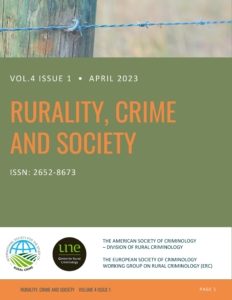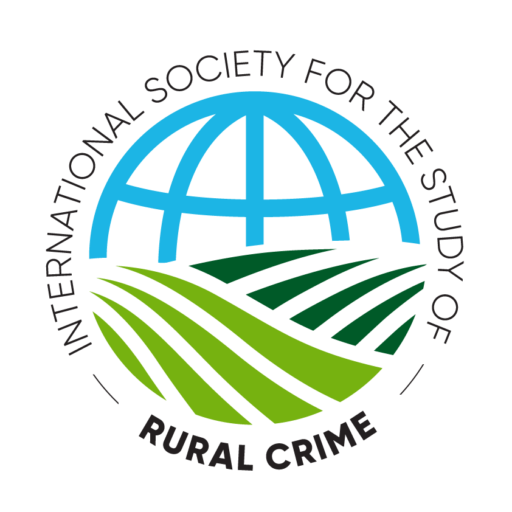ISSRC Blog
This blog provides an opportunity for pithy observations or reflections on topical rural crime news and developments, a summary of research, promotion of publications, advertisements for upcoming events… and more! If you would like to contribute, email a submission of no more than 500 words to admin@issrc.net
Access to justice in rural courts
Here is the second blog post in a series of short topic snapshots, prepared by Joseph Loades, a research student with the Centre for Rural Criminology at the University of New England.
 The access to justice has its issues in both urban and rural communities, however, rural communities suffer inequity at a higher rate. Two of the primary issues include the lack of lawyers and legal personnel that are willing to live in rural areas, and the lack of digital technology in many rural and remote jurisdictions.
The access to justice has its issues in both urban and rural communities, however, rural communities suffer inequity at a higher rate. Two of the primary issues include the lack of lawyers and legal personnel that are willing to live in rural areas, and the lack of digital technology in many rural and remote jurisdictions.
Access to justice is a principle of the rule of law. The Department’s report (Australian Law Reform Commission, 2019) states:
‘Access to justice’ is an essential element of the rule of law. In essence, access to justice refers to the ‘affirmative steps’ necessary to ‘give practical content to the law’s guarantee of formal equality before the law’. It refers to the need to ameliorate or remove barriers to access and ‘must be defined in terms of ensuring that legal and judicial outcomes are just and equitable’. It is enshrined in part 14 of the International Covenant of Civil and Political Rights (ICCPR). (p. 319)
The barriers concerning access to justice of legal representation and proceedings in rural communities lack equity. The inequity regarding the access to legal representation, involves both the quantity and quality of representation. It has been shown that while the rural population expands, the number of legal practices in the community decreases, leaving an overall shortage of lawyers per capita, compared to urban areas.
One problem contributing to the lack of lawyers in rural areas is the unwillingness of young personnel to live in rural areas for longer than two years, in part due to profitability, rewards and incentives.
 Other reasons include the things that make rurality unattractive to young lawyers such as a lack of professional peers, recreation, and culture (Rice, 2011).
Other reasons include the things that make rurality unattractive to young lawyers such as a lack of professional peers, recreation, and culture (Rice, 2011).
McKeon and Rice (2009) elaborate on the staffing issues, explaining the high pressure on Magistrates in rural areas due to the lack of attorneys, which increases the number of self-represented clients and professionality within the court. Other issues affecting Magistrates include the distances that need to be travelled, and the lack of modern digital technology within certain rural locations.
A major issue with accessing justice in the rural court system is the digital divide that exists between urban and rural areas. Quaintance (2022), explains the digital inequities that are developing which leave rural courts vulnerable when unable to access new technology. Issues that relate to being disconnected when attempting to access technology for remote hearings is a primary issue in areas that lack high-speed internet coverage.
 The individual victim and offender accessing internet technology can also be problematic. Emailing legal documentation to the court registry, and to lawyers, can be an issue for the lower socioeconomic groups who cannot afford internet access, and those that lack internet coverage due to geographical location. These issues are problematic within the rule of law when attempting to access viable means of justice.
The individual victim and offender accessing internet technology can also be problematic. Emailing legal documentation to the court registry, and to lawyers, can be an issue for the lower socioeconomic groups who cannot afford internet access, and those that lack internet coverage due to geographical location. These issues are problematic within the rule of law when attempting to access viable means of justice.
(Images sourced from pixels.com)
References
Australian Law Reform Commission. (2019). Access to Justice. https://www.alrc.gov.au/wp-content/uploads/2019/08/fr133_10._access_to_justice_issues.pdf
McKeon, J. C., & Rice, D. G. (2009). Administering Justice in Montana’s Rural Courts. Montana Law Review., 70(2), 1-20. https://scholarworks.umt.edu/cgi/viewcontent.cgi?article=2030&context=mlr
Quaintance, Z. (2022, Mar 31). What’s New in Digital Equity: The Digital Divide and Access to Justice. Government Technology. https://www.proquest.com/magazines/whats-new-digital-equity-divide-access-justice/docview/2645706065/se-2
Rice, S. (2011). Access to a lawyer in rural Australia: Thoughts on the evidence we need. Deakin Law Review, 16(1), 13-46. https://search.informit.org/doi/abs/10.3316/ielapa.490191503284612
Barriers faced by rural police services
Following is the first of a series of short topic snapshots, prepared by Joseph Loades, a research student with the Centre for Rural Criminology at the University of New England.
 Rural police services experience adversities that differ from urban areas, including the geographical distances that are needed to be covered, lack of government funding, minimal transport infrastructure, high rates of unemployment and poverty of residents, and rising rates of violent crime and property offences compared to non-urban areas.
Rural police services experience adversities that differ from urban areas, including the geographical distances that are needed to be covered, lack of government funding, minimal transport infrastructure, high rates of unemployment and poverty of residents, and rising rates of violent crime and property offences compared to non-urban areas.
Whilst police in urban areas face an extensive array of crimes and the suspects are mostly unknown to the police, rural police are based in communities where social networks are smaller, most members of the community are known to police, and a subjective and interdependent form of policing is used. In rural communities that are subject to an interdependent form of policing, crimes are generally lower than metropolitan areas and rural communities that use an objective and dependent form of policing (Nolan, DeKeseredy and Brownstein. 2022).
Within many rural communities’ economic resources tend to be limited due to deindustrialisation. Adversities such as unemployment, poor health, poverty, a lack physical and non-physical resources, and a high prevalence of crime is experienced in the lower economic status (LES). Economic statuses can dislodge bonds between varying social groups and cultures, creating issues for rural police – who are also part of the local community. The adversities experienced within the LES have been shown to be connected to higher rates of victimisation and offending, which is intergenerational in nature, and can become a part of community culture (Day et al. 2018).
Lack of government funding to rural police agencies can create many issues, which include low staff numbers, and a lack of police operated harm reduction methods, and police community service interventions. Wooley and Smith (2022) explain that rural police are often understaffed, under-trained, lack adequate equipment, have less time to spend on public relation exercises, which leads to a higher degree of scrutiny within their jurisdiction.
Furthermore, rural communities have a higher degree of conservative attitudes, gun ownership, have a higher population of white residents and extremist views, and a higher level of aversion to government interference and employment of personal social control. These physical and non-physical barriers, combined with large territorial jurisdictions make policing a challenging task.

The expansive geographical areas that need to be covered to access police services not only affects those needing to attend police stations for varying reasons, such as the face-to-face reporting of crime, it also affects the police who need to attend urgent crimes and motor vehicle accidents (Yarwood and Cozens, 2022). The large geographical distances affect police response times to attend urgent situations such as violent offences and property crimes, which are increasing within rural locations (Carcach 2000).
For rural police services to become more efficient, government funding needs to be addressed for police to expand harm reduction and public relation methods. Human resources are also required to alleviate the high rate of adversities suffered by rural residents and break down the economic barriers between social groups.
(Images sourced from pixels.com)
References
Carcach, C. (2000). Size, accessibility and crime in regional Australia (pp. 1-6). Canberra, Australia: Australian Institute of Criminology. https://www.aic.gov.au/sites/default/files/2020-05/tandi175.pdf
Day, A., Casey, S., Gerace, A., Oster, C. & O’Kane, D. (2018). The forgotten victims: Prisoner experience of victimisation and engagement with the criminal justice system. https://researchonline.jcu.edu.au/55219/1/Day%20et%20al%20-%20Research%20Report%20-%20The%20Forgotten%20Victims.pdf
Nolan, J. J., DeKeseredy, W. S. & Brownstein, H. H. (2022). Police Ethics in Rural Contexts: A Left Realist Consequentialist View. International Journal of Rural Criminology, 7(1), 1-23. https://ruralcriminology.org/index.php/IJRC/article/view/8958/7736
Wooley, M. J. & Smith, S. Z. (2022). Reaching Rural Police: Challenges, Implications, and Applications. Crisis, Stress, and Human Resilience: An International Journal, 4(1), 66-84. https://www.crisisjournal.org/article/36378-reaching-rural-police-challenges-implications-and-applications
Yarwood, R. & Cozens, C. (2017). Constable countryside? Police perspectives on rural Britain. In Geographies of rural cultures and societies (pp. 145-170). Routledge.
The latest issue of Rurality, Crime and Society is out now!
The latest issue of Rurality, Crime and Society is out! Download it now!

As well as the International Society for the Study of Rural Crime and the Centre for Rural Criminology, the newsletter is supported by the American Society of Criminology – Division of Rural Criminology and the European Society of Criminology Rural Working Group.
This latest issue has been edited by Dr Ziwei Qi and Dr Artur Pytlarz, who have done an excellent job.
In the newsletter, you’ll find the following features:
Message from the editors
– Dr Ziwei Qi and Dr Artur Pytlarz
A tribute to Prof Rick Ruddell
– Professor Emeritus Joseph F. Donnermeyer
Message from the Centre for Rural Criminology
– Dr Kyle Mulrooney, Dr Alistair Harkness and Dr Jenny Wise
Message from Professor Joseph Donnermeyer
– President of the ASC Division of Rural Criminology
Latest news from the ESC European Rural Criminology Working Group
– Dr Kreseda Smith and Dr Artur Pytlarz
Three research features
– Dr Robert Smith introduces a qualitative approach to studying rural criminal enterprise
– Paige Bromley discusses domestic violence services in rural UK
– Dr Emilia Jurgielewicz-Delegacz discusses her rural research in Poland
News and Announcements
– Upcoming conferences
– New and forthcoming books
– Call for special issue editors for the IJRC
